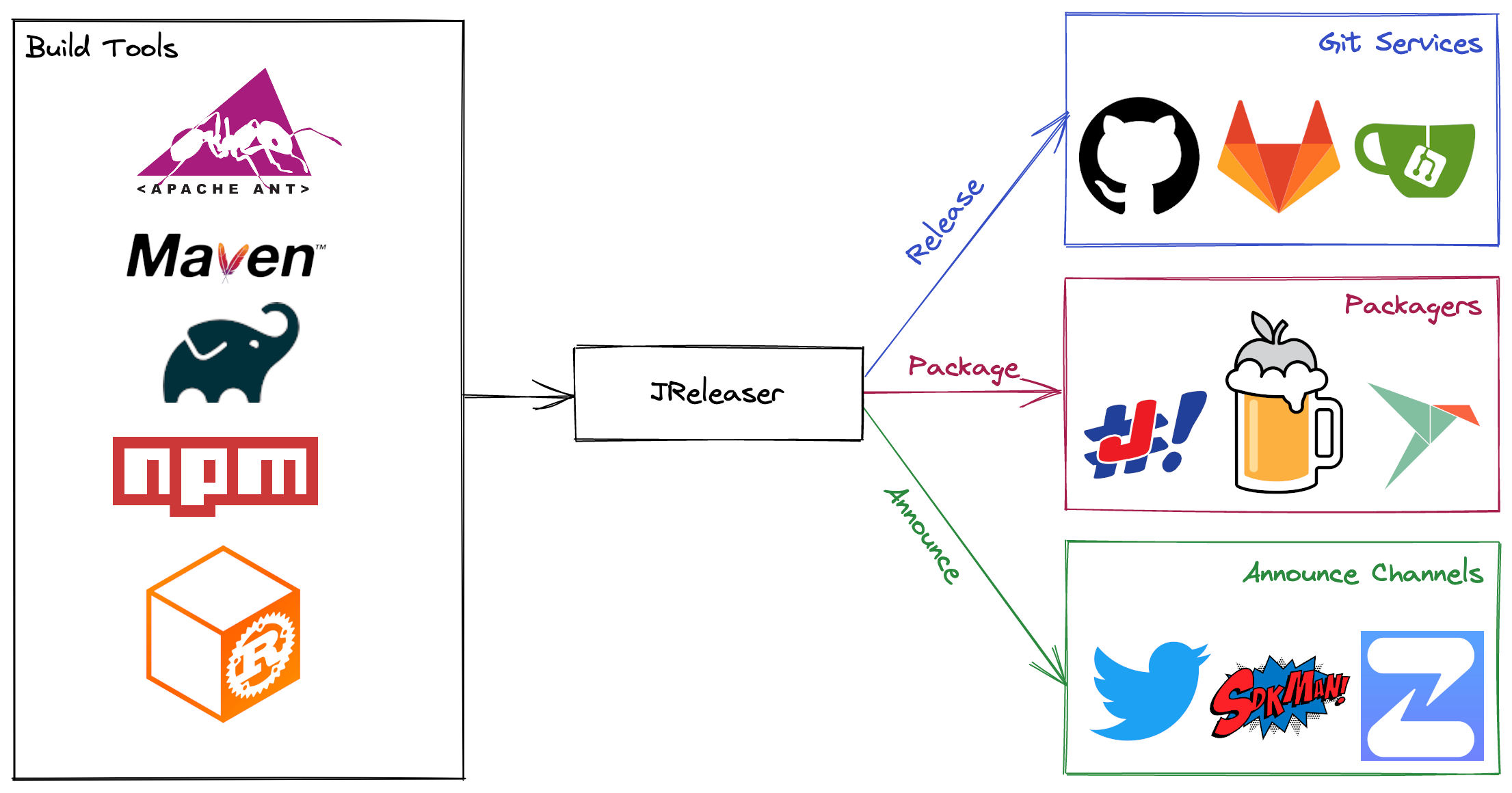JReleaser
JReleaser is a release automation tool. Its goal is to simplify creating releases and publishing artifacts to multiple package managers while providing customizable options. However, you may also use it with projects that do not require publishing binary assets. The tool can be used to create Git releases (tag, changelog, assets), announce releases, assemble additional binaries and files to be published via package managers. JReleaser supports any kind of project regardless of its source language (Java, Go, Node, Rust, Perl, Python, C/C++, C#, Elixir, Haskell, etc), although it provides additional benefits to Java based projects.
Examples of Java projects:
Examples of non-Java projects:
What it does
JReleaser takes inputs from well known build tools (Apache Ant, Apache Maven, Gradle, Cargo, NPM, Cabal, etc) such as JAR
files, binary distributions (.zip, .tar), JLink images, or any other file that you’d like to publish as a Git release
on popular Git services such as GitHub, GitLab, Gitea, or Forgejo. Distribution files may additionally be published to package
managers such as Homebrew, Snapcraft, Scoop, or get ready to be launched via JBang. Releases may be announced to a variety
of channels such as Bluesky, Mastodon, Zulip, Sdkman, and others. Have a look at the listed integrations.

JReleaser provides explicit integration via plugins for Apache Ant,
Apache Maven, and
Gradle build tools.
Use the
CLI for any other build tool (Java and non-Java alike).
How does it work
A release process can be customized with a jreleaser.[yml|toml|json] file if using the
CLI or
Apache Ant options, or
direct DSL configuration inside a
pom.xml ( Apache Maven) or
build.gradle ( Gradle) file.
Once setup, you can create a new release by invoking the full-release command or any other commands described in the
Workflow.
Every step of the release process is configurable. Inputs may be parameterized externally. Several input files may be provided as templates.
Where does it run
You can run JReleaser at your local development machine or at any of the supported CI/CD services.
Who is using it
A non-exhaustive list of projects that use JReleaser:
- ConnOR
-
A commandline tool for resetting Kafka Connect source connector offsets.
- Decodable Pipeline SDK
-
An SDK for implementing Flink jobs based on Decodable
- DiscoCLI
- Griffon
-
Next generation desktop application development platform for the JVM.
- Ikonli
-
Icon packs for Java applications.
- JBang
-
Unleash the power of Java - JBang Lets Students, Educators and Professional Developers create, edit and run self-contained source-only Java programs with unprecedented ease.
- JfrUnit
-
A JUnit extension for asserting JDK Flight Recorder events.
- JFXCentral
-
JavaFX powered desktop & web application collecting useful resources for JavaFX development.
- kcctl
-
A modern and intuitive command line client for Kafka Connect.
- mcs
-
Search the Maven Central Repository from your command line!
- Neo4j-Migrations
-
Automated script runner aka "Migrations" for Neo4j. Inspired by Flyway.
- redis-field-engineering
-
Many projects in the
redis-field-engineeringorganization make use of JReleaser. - Quarkus
-
Supersonic Subatomic Java.
- SceneBuilder
-
Scene Builder is a visual, drag 'n' drop, layout tool for designing JavaFX application user interfaces.
- SDKMAN!
-
The SDKMAN! Command Line Interface.
Acknowledgments
JReleaser is heavily inspired by GoReleaser. It also builds on top of the lessons learned from JBang's original build setup. Since July 2021 JBang’s releases are now posted via JReleaser.